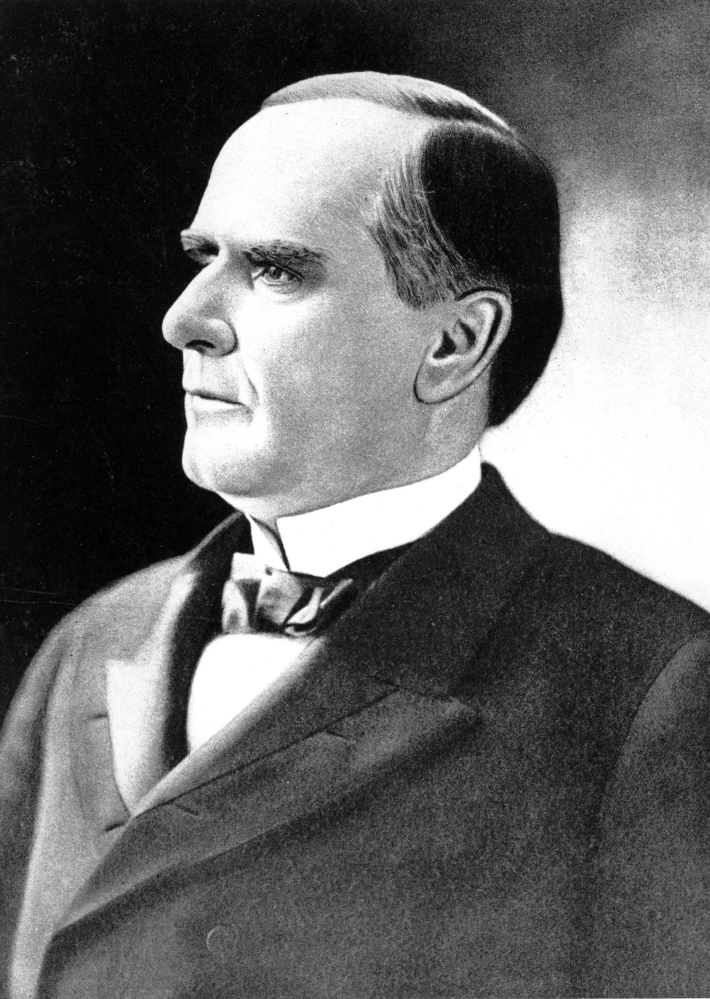He was a president for another century, another era of American political infighting.
William McKinley spent a little more than four years in the White House before his assassination in 1901 in Buffalo, N.Y. He also is remembered as a mediocre chief executive, controlled by his cronies and pressured into war with Spain by imperialistic newspapers of his day.
Supporters say McKinley’s subtle brilliance is in the details; a Republican president who faced tough decisions in his policy toward China and declared war with Spain over Cuban independence, who brought the U.S. into a new generation as an emerging world power.
Now the former president lies in the middle of a controversy over a mountain in a far-away Western state he never visited. On Monday, President Barack Obama officially redesignated Alaska’s Mount McKinley as Denali, the original Native American-inspired name for the tallest mountain in North America.
The name-change has inspired some to cry foul, especially those politicians representing Ohio, McKinley’s birth state, with most saying the name-swipe has disrespected the 25th president.
Starting late Sunday and continuing well into Monday, high-ranking Republicans led by House Speaker John Boehner and Ohio Gov. and presidential candidate John Kasich, voiced their disapproval.
“McKinley served our country with distinction during the Civil War as a member of the Army,” said a statement released by Boehner, who has represented the Cincinnati area for more than two decades. The statement detailed McKinley’s resume, including serving as governor of Ohio.
“I’m deeply disappointed in this decision,” Boehner’s statement read.
Denali is a native Koyukon Athabaskan word for “the Great One” or “the High One.” The mountain sits in Denali National Park, so named in 1975.
Lisa Murkowski, the GOP senator for Alaska who campaigned for the name change, tweeted Monday that she was “honored” to recognize the mountain as Denali.
For others, the move was tantamount to robbing Gen. George Washington of his obelisk-shaped monument in the nation’s capital, or having workers with drills and sandblasters scaling Mount Rushmore to efface the memory of one of the four greats memorialized there.
Rep. Bob Gibbs, another Ohio Republican, said of McKinley’s mountain namesake: “This landmark is a testament to his countless years of service to our country.”
The outcry even breached party lines, with Ohio Democratic Rep. Tim Ryan, whose district includes McKinley’s hometown of Niles, insisting that: “We must retain this national landmark’s name to honor the legacy of this great president and patriot.”
McKinley scholars feel caught in the middle.
Kim Kenney, curator of the McKinley Museum and Presidential Library in Canton, Ohio, said the man is bigger than any debate about a mountain name.
McKinley does not get enough credit for his time in office. “He’s very overshadowed by Teddy Roosevelt, who is larger than life,” Kinney said.
On some lists of great American presidents, McKinley ranks in the middle.
“He was responsible, through the Spanish-American War, for transforming America’s view of foreign policy from that of isolationism to becoming a legitimate world power.”
She acknowledged, however, that McKinley never set foot in Alaska during his lifetime and that the then-territory did not factor in his presidency.
“His legacy stands no matter what the mountain is called,” Kinney said. “The silver lining in all of this is that people are talking about William McKinley today. He doesn’t get discussed very often – not these days.”
Copy the Story LinkSend questions/comments to the editors.



Success. Please wait for the page to reload. If the page does not reload within 5 seconds, please refresh the page.
Enter your email and password to access comments.
Hi, to comment on stories you must . This profile is in addition to your subscription and website login.
Already have a commenting profile? .
Invalid username/password.
Please check your email to confirm and complete your registration.
Only subscribers are eligible to post comments. Please subscribe or login first for digital access. Here’s why.
Use the form below to reset your password. When you've submitted your account email, we will send an email with a reset code.